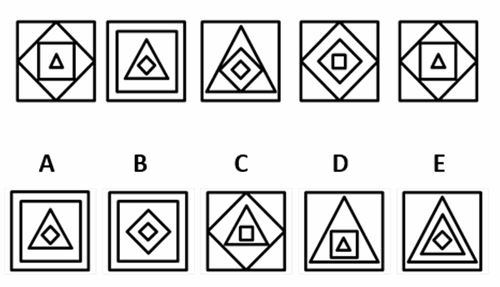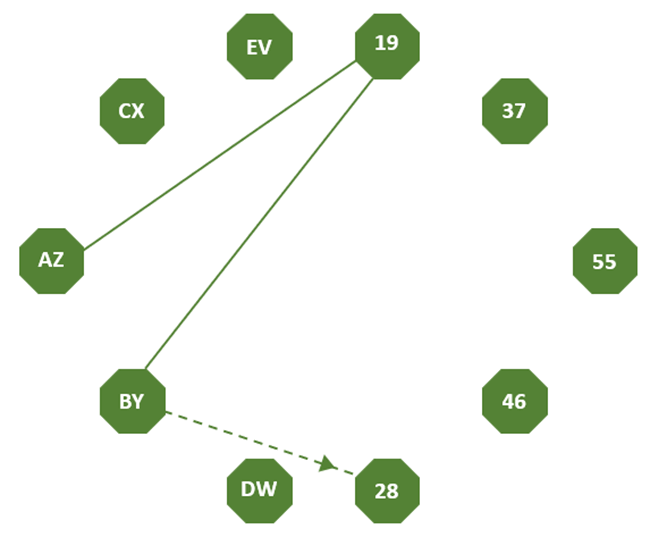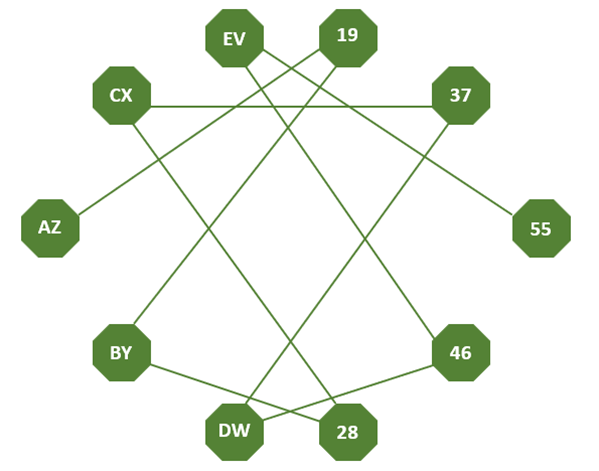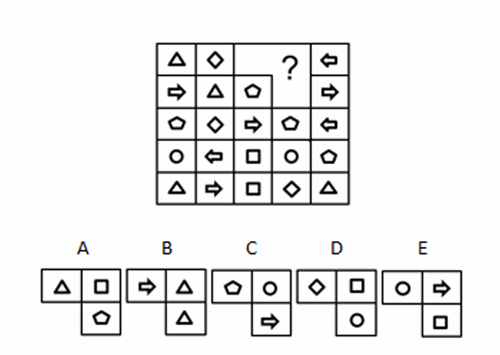The SHL Inductive Reasoning Test is a pre-employment assessment designed to evaluate a candidate's ability to identify patterns, trends, and to draw a probable conclusion based on specific observations or evidence.
The test requires candidates to answer each question within a time limit of less than 60 seconds, emphasising the importance of adequate preparation and practice to succeed in the actual test.
To ensure you are prepared for SHL Inductive Test, we have developed a dedicated PrepPack that will ensure you will be fully prepared and confident on test day. The PrepPack includes:
- SHL Inductive Full Test Simulations & Study Guides - allowing you to practice the actual test's time constraints, format, and types of questions you will encounter on the actual test and identify your weak areas. Including both interactive and non-interactive SHL Inductive simulation tests.
- Additional Inductive Practice Tests - covering all the topics and sections you'll face in the SHL Exam. The practice tests will allow you to thoroughly practice your weak points, as revealed by the full test simulation.
- Dedicated Video Tutorials & Study Guide - enabling a deep understanding of the theory behind each test section and the most optimal techniques to answer the questions.
What Is the SHL Inductive Reasoning Test?
Inductive reasoning tests, sometimes known as abstract or logical reasoning tests, measure your problem-solving skills using non-verbal and non-numerical questions. These tests require you to recognise patterns and consistencies among sets of objects to predict a future trend.
Here’s an example for one of the most common Inductive Reasoning question types on SHL’s tests:
SHL Common Inductive Reasoning Sample Question
Choose the image that completes the pattern:

Answer with Explanation
The correct answer is (A).
The inner shape in one frame becomes the middle shape in the next frame; the middle shape becomes the outer shape in the next frame; and the outer shape becomes the inner shape two frames later. Thus, the outer shape in the missing frame should be a square (just like the middle shape in the 5th frame), the middle shape should be a triangle (like the inner shape in the 5th frame), and the inner shape should be a diamond (like the outer shape in the 4th frame).
Did you manage to answer it correctly? Don’t worry if you didn’t get it right. Further below we’ll show you exactly how to solve such question types.
Because on the real SHL Inductive Reasoning test, you’ll have a little more than 60 seconds to answer each of these questions, so it's important to come prepared.
Inductive Reasoning VS Deductive Reasoning: What's the Difference?
Some job candidates need to take both inductive and deductive assessment tests. And while they may seem similar, they actually measure different abilities.
Inductive reasoning is usually (but not always) evaluated using abstract tests. These require you to examine figural data, look for patterns, and reach a conclusion. Inductive reasoning question types include finding the next figure in a series, which part of a puzzle is missing, or which figure should replace the empty cell in the matrix.
Deductive reasoning, on the other hand, will often be verbal. The test taker is given a set of rules or premises and then must use them to decide whether certain conclusions can be drawn from them.
Now, Let’s see what you’re about to face on the SHL Inductive tests.
What to Expect on the SHL Inductive Test?
As of 2020, there are three different versions to the SHL Inductive Reasoning test, which differ in their time limits, question types, and difficulty level:
- SHL Verify G+ Inductive Reasoning Test (Interactive)
- SHL Verify G+ Inductive Reasoning Test (Non-Interactive)
- CEB Verify Inductive/Logical Reasoning
Here’s an overview of each version, plus sample questions, so you start to get a feel for the test:
SHL Verify G+ Inductive Reasoning Test (Interactive)
Number of questions: 15
Time limit: 18 questions
Unique instructions: the instructions will specifically say, “…an activity-based test that allows you to drag, drop, and interact…
The Interactive SHL Verify G+ Inductive test is one of SHL’s new assessments that changes the way standard assessment tests look and feel.
On this test, rather than simply choosing an answer option, you fully interact with the question. You’ll need to drag lines to finish sequences, tap to fill the next image in the sequence, memorise button behaviour, and more.
This, in turn, makes the questions much harder, as it takes more time to understand what they want from you and plan how you’re going to solve it.
(All of that in about 70 seconds per question!)
Let’s see an example of a question type you’ll likely see on the interactive version.
SHL Interactive Inductive Reasoning Sample Question
Complete the sequence:

Note: on the real test, you’ll be asked to “drag the line to finish the sequence.”
AZ -> 19 -> BY -> 28 -> _____ -> _____ -> _____ -> _____ -> _____ -> _____
Answer with Explanation
In this question, the given connected nodes are AZ -> 19 -> BY and a dashed arrow instructing you to connect BY to 28.
As can be seen, each node containing letters is connected to a node containing a two-digit number, starting with the AZ node.
AZ – 19: AZ is made of the two letters from opposite extremes of the alphabet; A is the first letter in the alphabet, and Z is the last letter. Following a similar pattern, 1 is the smallest number in the group of nodes, while 9 is the biggest number in the group of nodes.
BY – 28: B is the second-from-the-beginning letter and Y is the one-before-last letter in the alphabet, 2 is the second small number, while 8 is the second biggest number, from the top, in the group of nodes.
CX – 37: C is the third-from-the-beginning letter and X is the two-before-last letter, 3 is the third small number, while 7 is the third biggest number, from the top, in the group of nodes.
And so forth.

SHL Verify G+ Inductive Reasoning Test (Non-Interactive)
Number of questions: 18
Time limit: 24 minutes
Unique instructions: “After each question, there are four or five response options.” And “Click on the answer…” indicates it’s not an interactive assessment.
The non-interactive SHL Verify G+ Inductive test, unlike the interactive version, is a classic multiple-choice test.
Similarly to the older test version of the CEB SHL Logical Inductive test, most of the exam includes figural series and pattern completion questions.
(Though the CEB SHL Inductive version has 24 questions in 25 minutes)
Let’s see an example that resembles some of the questions you’ll see on the real test (in both of these non-interactive versions):
SHL Non-interactive Inductive Reasoning Test Example
Choose the image that completes the pattern:

Answer with Explanation
The correct answer is (D).
In each row and in each column, one and only one of the shapes appears twice.
If we look at the 2nd row from the top, we can see that it already contains a shape that appears twice (the arrow pointing right). Thus, we need to look for an option that would complete this row with a shape that does not already appear in it (i.e. a shape other than an arrow pointing right, a triangle, or a pentagon). This allows us to eliminate options A, B, and C.
Now, if we look at the 1st row, we can see that none of the shapes appears twice. So, the correct answer must either include one of the shapes that already appears in this row (a triangle, a diamond, or an arrow pointing left), or it must include two identical shapes that do not yet appear in this row. Option E does not fulfill this requirement, leaving us with option D.
How to Pass SHL Inductive Reasoning Test?
Seeing these inductive reasoning questions for the first time might be overwhelming.
No one teaches you how to solve these in high school, and some questions look like they have no logic behind them. Also, it feels impossible to answer all of them under such tough time pressure.
That’s why preparation is the ultimate tool for passing these tests.
By preparing beforehand, you’ll know exactly what question types to expect (what you’ve seen above is only a small fraction). And more importantly, you’ll learn how to solve each question type.
Because, after all, every inductive reasoning question follows a certain rule or logic. And once you master them, everything becomes clearer.
Now:
Today there are three available practice options:
- The SHL Direct Inductive Reasoning practice test and sample questions
- Our free SHL practice test
- JobTestPrep’s complete SHL Inductive Reasoning practice pack
Why Practising Just Using SHL Direct Might Not Be Enough?
The SHL direct practice is usually the first prep option you see, as it often appears in the assessment invitation email.
This site includes a few sample questions (with no explanations) and two practice tests for the interactive and non-interactive SHL Inductive tests.
That said, there are three immediate problems with the SHL Direct practice site:
- SHL mentions that the practice tests' difficulty level doesn’t mirror the real test’s level. This means that you can’t really diagnose your level of knowledge nor predict how well you’ll do on the actual assessment.
- If you take the interactive practice test, you won’t get any score report whatsoever. If you choose the non-interactive one, you only get a score report that tells you how many questions you got right and wrong, without mentioning which one. So, you can’t know what question types to practice harder.
- The non-interactive score report doesn’t have any solutions or explanations. This means that you’re unable to learn from your mistakes and you must search for other online sources to improve your solving skills.
And this leads us to the second practice option...
JobTestPrep’s SHL Inductive Reasoning Practice Tests
JobTestPrep is currently (2024) the only test prep company that offers thorough practice for SHL’s interactive test version. During the past 7 years, we've prepared more than 24,000 candidates for their SHL Assessments!
We constantly update our PrepPacks to provide the most accurate prep.
✔ Dozens of SHL-style Inductive practice tests covering all three test versions (interactive, non-interactive, CEB).
✔ Step-by-step solutions for every practice question, ensuring you understand the logic behind every question and that you’ll know how to answer them on the real test.
✔ Realistic difficulty levels and time limits to prepare you for the real conditions and their limited time.
✔ Extra practice drills to give you an additional boost and ensure that you won’t only pass the test, but also get to the highest percentiles.
SHL Inductive Reasoning Scores Explained
Every candidate that completes the SHL Inductive test receives a PDF named ‘Candidate Assessment Report’.
In this report, you’ll see your test results and general feedback. Note that the scores are comparative, meaning they are compared to a large group of test-takers who took the same test in the past.
So, the report will indicate if your /inductive /reasoning ability is likely or unlikely to be a strength compared to the comparison group.
Your result will be placed in one of five grade groups, from A to E:

The higher your score is, the closer you’ll be to group A. Unfortunately, the SHL Inductive Reasoning average score is unknown as SHL doesn’t disclose this information.
The cut-off scores, however, differ depending on the hiring company. So, while one company’s cut-off might be in the 80th percentile, others might be in the 90th.
Since most companies don’t reveal their cut-off scores, your main goal should be prepping beforehand and scoring as high as possible.
3 SHL Inductive Reasoning Test Tips to Help You Answer Questions Faster
- Usually, in figural series and pattern completion questions, 2 to 3 answer choices are far off the correct answer. So, if you see you’re short on time or can’t identify the exact pattern of the question, try to disqualify those answers quickly.
- In figural series problems that have a question mark (?) in the middle, first, look at the longest sequence available to the left/right of the question mark. Then, quickly eliminate distractors and try each of the remaining answer choices until you find the correct shape.
- The majority of the test’s questions involve identifying a hidden logical rule to answer them. To improve your ability to spot these rules quickly, try practising number and letter series questions. While these questions differ in their format and structure from inductive reasoning questions, they help develop and sharpen this crucial skill.
Create Your Custom Assessment Prep Kit
Job-seeking can be a long and frustrating process, often taking months and involving numerous pre-employment tests and interviews. To guide you through it, we offer a Premium Membership.
Choose 3 Preparation Packs at 50% discount for 1, 3, or 6 months.
More Free Practice
We at JobTestPrep find the assessment tests world highly diverse and fascinating. If you are looking to deepen your knowledge in the aptitude tests world, or you want some extra practice before your test, we've got you covered!
Check out these fantastic free practice tests (all are completely free):
Free Aptitude Test | Free Psychometric Test | Free Numerical Reasoning Test | Free Verbal Reasoning Test | Free Cognitive Test | Free Critical Thinking Test | Free Abstract Reasoning Test | Free Spatial Reasoning Tets | Free Personality Test | Free Inductive Test | Free Mechanical Reasoning Test




